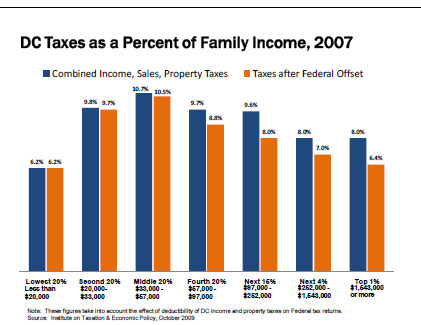What would you think about a tax system in which lower-income families pay a greater share of their income in taxes than better-off families? Most of us would say that is unfair, right?
Yet that is precisely how DC’s tax system works, according to a new study from the Institute for Taxation and Economic Policy. It finds that DC taxes fall most heavily on moderate-income families ‘ and that taxes paid by wealthier families are a lot smaller as a share of income.
- Moderate-Income DC Families Face the Highest Tax Rates: Families with incomes of $20,000 to $60,000 pay about 10 percent of their incomes in DC property, sales, and income taxes.
- The Wealthiest DC Families Pay Much Less: The richest one percent of DC households ‘ those with incomes above $1.5 million ‘ paid 6.4 percent of income in DC taxes in 2007. This is lower than the tax rate for any other income group, other than the poorest families.
The difference in tax rates is significant. If families in the middle of DC’s income distribution ‘ $45,000 ‘ faced the same tax rate as the richest one percent of families, they would pay $1,900 less.
The new analysis has one important bright spot ‘ that the city’s poorest families face the lowest combined DC taxes ‘ 6.2 percent ‘ largely due to a substantial DC Earned Income Tax Credit for the working poor. But for all other families, taxes as a share of income get smaller as incomes get larger.
The main reason for the unfairness of DC taxes is the city’s reliance on regressive sales and excise taxes. The sales tax falls most heavily on low-income residents because they spend a greater portion of their income on goods and services than higher income residents. DC’s property tax is regressive, too. DC’s income tax is progressive, with rates that get higher as income rises, but not enough to offset the unfair impact of other taxes. Also, the new study shows that DC is not alone and that most states have tax systems.)
This information is important as the District struggles with a projected budget shortfall of $300 million for fiscal year 2011 ‘ and the possibility of raising taxes to partly address it. It will be important to consider whether any proposed increases would make DC’s tax system more regressive.
But when a mix of taxes were put on the table last July to close the city’s $330 million gap for FY 2010, our elected officials chose largely regressive options. At that time, the DC Council adopted $42 million in revenue increases, including increases in sales, cigarette, and gasoline taxes. While these tax increases helped limit the need for cuts in services, all of the increases fall most heavily on lower-income households. There were no progressive tax increases for 2010.
DC’s tax system is changing all the time. We hope the new report will keep elected leaders mindful of who is paying for DC government and how we can make sure that the tax systems is as fair as possible.

